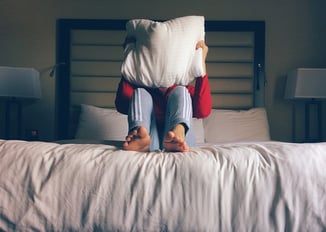Blog
- snoring (27)
- apnoea (20)
- sleep study (10)
- apnea (9)
- CPAP (7)
- Sleep studies (7)
- weight gain (6)
- sleep deprivation (5)
- sleep disorders (5)
- surgery for apnoea (5)
- diabetes (4)
- sleep apnoea (4)
- OAT (3)
- OSA (3)
- Pregnancy (3)
- Snore (3)
- children (3)
- heart disease (3)
- hypertension (3)
- in home sleep studies (3)
- obesity (3)
- polysomnogram (3)
- surgery for apnea (3)
- ADHD (2)
- Alzheimers (2)
- CPAP treatment (2)
- Gladstone CPAP (2)
- PSG (2)
- UPPP (2)
- apnea pregnancy (2)
- apnoea pregnancy (2)
- apnoea surgery (2)
- blood pressure (2)
- cognitive impairment (2)
- cpap supplies brisbane (2)
- cpap therapy (2)
- dementia (2)
- dental treatment for apnoea (2)
- dental treatment for snoring (2)
- diabetic peripheral neuropathy (2)
- driving (2)
- holiday (2)
- in home sleep study (2)
- kids (2)
- menopause (2)
- obstructive sleep apnoea (2)
- oral appliance therapy (2)
- sleep (2)
- sleep apnoea and weight (2)
- sleep apnoea study (2)
- sleep apnoea women (2)
- sleep clinics (2)
- sleep disordered breathing (2)
- sleeping tips (2)
- type 2 diabetes (2)
- Apnea Winter (1)
- Apnoea Winter (1)
- Apnoea and heart disease (1)
- Brisbane sleep study (1)
- CPAP Supplies (1)
- CPAP effectiveness (1)
- CPAP success rate (1)
- Christmas (1)
- Coal Board Medical (1)
- Coal Board Medicals (1)
- Depression (1)
- Emerald sleep clinic (1)
- Festive Season (1)
- Frequent Urination (1)
- Gladstone sleep study (1)
- Gladtone sleep studies (1)
- IQ (1)
- Nocturia (1)
- Nocturia Causes (1)
- OSA and obesity (1)
- Obstructive Sleep Apnoea and Cancer (1)
- Patient feedback on CPAP (1)
- SDB (1)
- Sleep Apnoea Treatment Leads To Cost Savings (1)
- Sleep and Depression (1)
- Sleep and pain (1)
- Sleep-related Breathing Disorder treatment (1)
- Sleeping on a plane (1)
- UARS (1)
- Upper Airway Resistance Syndrome (1)
- accupressure (1)
- accupressure treatment for snoring (1)
- alarm (1)
- alzheimers disease (1)
- anti snoring (1)
- apnea and cancer (1)
- apnea cognitive impairment (1)
- apnea dementia (1)
- apnea depression (1)
- apnea diabetes obesity cancer (1)
- apnea surgery (1)
- apnea treatment (1)
- apnoea cognitive impairment (1)
- apnoea dementia (1)
- apnoea depression (1)
- apnoea diabetes obesity cancer (1)
- apnoea diagnosis regional qld (1)
- apnoea diagnosis regional queensland (1)
- apnoea government funding (1)
- apnoea in children (1)
- apnoea in women (1)
- apnoea treatment (1)
- apnoea treatment regional qld (1)
- apnoea treatment regional queensland (1)
- bad sleeping habits (1)
- belly fat (1)
- benefits of home sleep study (1)
- best treatment (1)
- best treatment for apnoea (1)
- best treatment for snoring (1)
- blue light (1)
- bmi (1)
- brain (1)
- brain activity while sleeping (1)
- brain damage (1)
- breast cancer (1)
- brisbane cpap (1)
- brisbane cpap supplies (1)
- brisbane home based sleep study (1)
- can't sleep (1)
- cancer (1)
- cancer and apnea (1)
- cardio metabolic disease (1)
- catch a cold (1)
- childhood apnoea (1)
- children snoring (1)
- cleaning cpap machine (1)
- cold (1)
- compression bandages (1)
- consequences of snoring (1)
- cpap 2018 (1)
- cpap and sexual function (1)
- cpap brisbane (1)
- cpap cleaning (1)
- cpap diabetes sight (1)
- cpap diabetic retinopathy (1)
- cpap diabetic sight (1)
- cpap gladstone (1)
- cpap machine (1)
- cpap mask (1)
- cpap masks (1)
- cpap problems and solution (1)
- cpap risks (1)
- cpap supplies gladstone (1)
- cpap supplies qld (1)
- cpap supplies queensland (1)
- cpap treatment forever (1)
- cpap tubing (1)
- customer feedback (1)
- danger (1)
- diagnostic sleep study (1)
- dissatisfaction with UPPP (1)
- do I need a sleep study (1)
- driver fatigue queensland (1)
- effects of oversleeping (1)
- effects of sleep disorders on teenagers and childr (1)
- employment (1)
- exercise (1)
- exercise helps snoring (1)
- facebook apnoea (1)
- facebook snoring (1)
- fail (1)
- female apnoea (1)
- female sleep apnea (1)
- female sleep apnoea (1)
- female snoring (1)
- fertility (1)
- funding apnoea research (1)
- gender difference (1)
- genes (1)
- genetics (1)
- getting a sleep study in Brisbane (1)
- gladstone cpap supplies (1)
- gladstone home based sleep study (1)
- guided sleep meditation (1)
- health facts (1)
- help me sleep (1)
- hereditary (1)
- hidden epidemic (1)
- high blood pressure (1)
- hitting snooze (1)
- home based preferred (1)
- home based recommended (1)
- home based sleep study brisbane (1)
- home based sleep study gladstone (1)
- home sleep study (1)
- how to correct sleep disorders (1)
- how to fall asleep faster (1)
- how to stay awake (1)
- humidifier (1)
- impact of snoring (1)
- impaired judgement (1)
- insomnia (1)
- insomnia causes (1)
- kid sleeping tips (1)
- lack of sleep (1)
- loud snoring (1)
- memory (1)
- misdiagnosis (1)
- muscle pain (1)
- myths (1)
- natural solution (1)
- neck circumference (1)
- neck size (1)
- new year (1)
- obesity and sleep (1)
- obstructive sleep apnea (1)
- oh&s (1)
- overindulgence (1)
- oversleeping (1)
- oversleeping side effects (1)
- pinkie ring (1)
- poor sleep (1)
- preeclampsia (1)
- prevalence (1)
- problems with dental treatments for sleep disorder (1)
- problems with oat (1)
- psychology (1)
- queensland regional sleep clinic (1)
- queensland regional sleep clinics (1)
- queensland sleep studies (1)
- recover (1)
- regional sleep clinic (1)
- regional sleep clinics (1)
- regional sleep studies (1)
- relationships (1)
- research (1)
- resolution (1)
- separate rooms (1)
- severe sleep apnoea (1)
- sex (1)
- side effects of snoring (1)
- skipping cpap (1)
- sleep affects learning (1)
- sleep and cancer (1)
- sleep and obesity (1)
- sleep apnea (1)
- sleep apnea and alzheimer (1)
- sleep apnea and health (1)
- sleep apnea and ischemic heart disease (1)
- sleep apnea and stroke (1)
- sleep apnea cancer (1)
- sleep apnea causes (1)
- sleep apnea clinic CBD brisbane (1)
- sleep apnea prevention (1)
- sleep apnea studies (1)
- sleep apnea study (1)
- sleep apnea symptoms (1)
- sleep apnea teenagers (1)
- sleep apnea what is it (1)
- sleep apnea women (1)
- sleep apnoea and ischaemic heart disease (1)
- sleep apnoea and stroke (1)
- sleep apnoea and weight gain (1)
- sleep apnoea and weight loss (1)
- sleep apnoea brain damage (1)
- sleep apnoea cancer (1)
- sleep apnoea female (1)
- sleep apnoea studies (1)
- sleep apnoea symptoms (1)
- sleep apnoea teenagers (1)
- sleep apnoea treatment (1)
- sleep clinics gladstone (1)
- sleep depression (1)
- sleep deprived (1)
- sleep disorder (1)
- sleep disorder signs (1)
- sleep disorder symptoms (1)
- sleep drunkenness (1)
- sleep duration (1)
- sleep meditation (1)
- sleep myth (1)
- sleep paralysis (1)
- sleep problem (1)
- sleep studies bariatric surgery (1)
- sleep study Brisbane (1)
- sleep tracker watch (1)
- sleep watch (1)
- sleeping habits (1)
- sleepless (1)
- sleepstyle (1)
- smartwatch (1)
- smartwatch sleep (1)
- smoking (1)
- snooze (1)
- snooze button (1)
- snooze health effects (1)
- snore cure (1)
- snorer (1)
- snoring cure (1)
- snoring cures (1)
- snoring depression (1)
- snoring facts (1)
- snoring pregnancy (1)
- snoring problem (1)
- snoring problems (1)
- snoring solution (1)
- snoring statistics (1)
- snoring tips (1)
- socks (1)
- stigma (1)
- stockings (1)
- stop snoring (1)
- stress (1)
- stroke (1)
- success (1)
- success rate of cpap machines (1)
- surgical treatment apnoea (1)
- surgical treatment for sleep apnoea (1)
- surviving stress (1)
- symptoms of sleep apnea (1)
- symptoms of sleep apnoea (1)
- technology (1)
- teenage sleep disorders (1)
- teenager (1)
- testimonial (1)
- tips on snoring (1)
- travelling (1)
- treatment for apnea (1)
- treatment for apnoea (1)
- truck driver sleep (1)
- truck drivers (1)
- truck drivers apnea (1)
- truck driving (1)
- use cpap with a cold (1)
- using cpap (1)
- weight (1)
- what happens when you sleep (1)
- what is sleep apnea (1)
- why do we sleep (1)
- women (1)
- women apnoea (1)
- women sleep apnea (1)
- women sleep apnoea (1)
- women snoring (1)
- work (1)
Sleep Paralysis: Causes, Symptoms, Treatment, Prevention (Full Guide)
 Imagine waking up in the middle of the night with a dark show standing near you, holding you down, and making you incapable of moving or even speaking.
Imagine waking up in the middle of the night with a dark show standing near you, holding you down, and making you incapable of moving or even speaking.
It might sound like a horror movie scene but it’s known as sleep paralysis, a waking nightmare for most people.
During sleep paralysis, you feel an odd electricity sensation through your whole body.
Although it only lasts for a couple of minutes, it’s still is a scary experience for some.
You feel like being unconscious and your body can’t move whether you’re either trying to fall asleep or trying to wake up.
If someone is falling asleep in a normal condition, their body usually becomes unaware of any changes that happen to their body.
Alternatively, your muscles are usually turned off during the cycle of REM sleep.
And if someone is suffering from sleep paralysis, their mind becomes aware during the end of their REM sleep cycle, which makes them incapable of moving their body at that moment.
Although sleep paralysis might come across as a rare scary scenario, it’s actually a relatively common condition that people suffer from.
Matter of fact, according to Prevalence of Sleep Paralysis, there are more than 30 studies conducted on sleep paralysis resulting in a sample size of over 36,000 people. And through that, they found out that roughly 8% of people are experiencing sleep paralysis.
Causes of Sleep Paralysis
 Although sleep paralysis might seem terrifying, it’s often a harmless condition.
Although sleep paralysis might seem terrifying, it’s often a harmless condition.
And one of the main cause of sleep paralysis is none other than sleep deprivation, sleep deprivation that is caused by:
- Sleep apnea and snoring
- Changing sleep schedules
- Medications
- Anxiety
- Stress
- Alcohol Consumption
- Using nicotine and drugs
- Narcolepsy
Symptoms of Sleep Paralysis
When you’re waking up or falling asleep, you’ll be unable to move or speak in less than a minute or two.
Some people have also reported having hallucinations and feeling a mild choking sensation on them.
In fact, it was thought that sleep paralysis was caused by demons holding people down because of these symptoms that people reported in the past.
But these hallucinations and choking feeling that they commonly experienced are simply because of the state of their brain during REM sleep.
If you’re one of those people who’ve experienced sleep paralysis before, you might find it shocking that the hallucination you had was exactly the same as other people whose suffering from sleep paralysis.
Although sleep paralysis might come across as a supernatural condition, there’s actually a logical explanation behind it.
According to a research in Consciousness and Cognition, there are actually 3 types of sleep paralysis hallucinations:
- The Intruder
According to Cheyne, Rueffer, and Newby-Clark of Consciousness and Cognition, the intruder that you see or feel during the stage of sleep paralysis is caused by the hypervigilant state in your midbrain.
- Incubus
Incubus is often described as choking or a pressure sensation on the chest that results to breathing difficulties and chest pains.
As you go through the REM stage, you’ll feel effects of hyperpolarization of motoneurons on perceptions of respiration. A sensation where you may feel like someone is holding on to your muscles especially on your chest.
- Unusual Bodily Experiences
Sufferers of sleep paralysis experience a floating out-of-body feeling of bliss and the main reason for this is because you’re awake.
A part of your brain in the centres of your brainstem is responsible for regulating your sleeping and waking cycle.
This part of your brain then connects your body to the external world which often results in said ‘unusual bodily experiences’ during your sleep.
According to Cheyne, Rueffer and Newby-Clark, those who are fairly new to the experience of sleep paralysis mostly experience the Intruder type of sleep paralysis. While those who suffered sleep paralysis for a long time mostly experience bodily hallucinations.
So, if you’re new to sleep paralysis, you must keep in mind that understanding how your brain works will help you calm down and make a sleep paralysis episode less terrifying.
 Treatment for Sleep Paralysis
Treatment for Sleep Paralysis
We all know how terrifying sleep paralysis can be, especially if you’ve never experienced it before.
But don’t be afraid, the most important thing to remember is to stay calm and realise the fact that it’ll only last for a minute or two.
Don’t panic, try to regulate your breathing, and focus your attention on something else like moving your finger or toe.
The best thing to do is to remind yourself that everything is just a hallucination, that it’s a normal condition that different people experience.
The bad news is that there is no treatment for sleep paralysis. Prevention is the key!
Prevention for Sleep Paralysis
To completely prevent sleep paralysis from occurring during your sleep, you need to improve your sleep hygiene.
Here are some great tips to do in order to prevent sleep paralysis from happening:
- Take a nice warm bath before going to sleep
- Limit down your screen time at night especially during bedtime (watching TV, using your phone, etc.)
- Don’t consume any alcohol or eat a heavy meal before going to bed
- Sleep on your side
- Reduce or eliminate caffeine in your daily diet
- Be consistent with your sleep schedule.
According to any doctors, sleep paralysis is something that you shouldn’t be worried about. It’s simply a sign indicating that your body is transitioning through sleep.
However, if your experiencing sleep paralysis frequently then it’s important to go see your doctor or book an in-home sleep study to find out the underlying cause of your sleep disorder problem.
